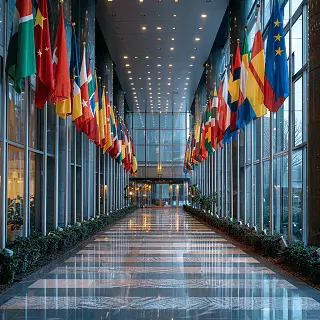 中国IT知识门户
中国IT知识门户
 中国IT知识门户
中国IT知识门户

基本定义
活动,在中文语境中,是一个涵义广泛的词汇。其核心指代个体或群体为了特定意图而进行的动态行为、运作或事件过程。它并非静止的状态,而是蕴含着行动、变化与能量消耗的特征。无论是孩童的游戏, 的工作,还是社区内的集会庆典,凡涉及有意识的行动参与,皆可纳入活动的范畴。这个词语常与主动性、参与度紧密相连,强调主体在其中的投入作用。
日常应用与核心特征在日常语言中,活动常被用来描述那些有组织、有目的的事件集合。例如,学校举办的“课外活动”,公司组织的“团队建设活动”,社区发起的“公益活动”,乃至个人的“休闲活动”等。这些用法均突出了活动的策划性、目的性和集体参与性。活动的根本特征在于其动态属性,它区别于静止的物体或状态。活动必然涉及能量(无论是物理的、脑力的还是社交的)的运用或转化过程。其次,活动通常具有明确的指向性,即为了实现某种目标、满足某种需求或体验某种过程而存在,无论是娱乐消遣、知识获取、技能提升、社交联络还是经济生产。
互动性与情境性活动往往包含着互动元素。这种互动可能发生在人与人之间,如讨论交流;人与物之间,如操作工具;乃至人与自然或环境之间。活动的进行高度依赖具体的情境。同样的行为,在不同的时间、地点、文化背景下,其意义、规则乃至命名都可能截然不同。例如,将一群人聚集在一起唱歌跳舞,在节日庆典中是庆祝活动,在专业场所则可能是艺术表演活动。活动通常由一系列相互关联的动作序列或环节组成,具有时间上的延续性和逻辑上的连贯性。
在教育与发展中的关键作用在儿童发展及教育领域,活动扮演着至关重要的角色。它被视为个体认知能力、运动技能、情感表达、社交规则习得和社会意识培养的核心途径。通过参与精心设计或自发产生的活动,个体得以在实践中学习、在体验中成长。社会生活中的各类活动是维系社会结构、传播文化价值、凝聚群体共识、促进信息交流和经济协作的基础单元。从宏观的社会运转到微观的个体日常生活,活动构成了人类社会动态图景的基本像素。
休闲娱乐类活动
此类别涵盖所有以放松身心、寻求乐趣、消磨闲暇为主要目的的行为。其形式极为多样:体育运动是典型代表,如跑步、游泳、球类项目、瑜伽、登山等,既锻炼体魄,也带来竞技或挑战的愉悦感。艺术与创作活动包括绘画、书法、演奏乐器、歌唱、写作、手工制作等,满足审美需求与自我表达。媒体娱乐涉及观看影视作品、欣赏音乐、阅读书籍报刊、玩电子游戏等较为被动的享受形式。社交娱乐如朋友聚会、聊天、桌游、参加派对等,重在人际互动带来的愉悦。观光旅游则是通过探索新环境、体验异域文化来获得身心放松和知识增长。休闲娱乐类活动的核心价值在于缓解压力、恢复精力、提升个人幸福感,并为日常生活注入活力与色彩。
学习与发展类活动这类活动以获取知识、提升能力、实现个人成长为核心目标。正规教育活动是主干,包括学校教育各阶段的课堂学习、实验操作、考试测评等;职业教育中的技能培训、资格认证也属此类。非正式学习活动范围更广,如参加讲座、研讨会、工作坊、在线课程学习、阅读专业书籍、进行学术研究等自主学习行为。技能训练活动侧重于实际操作能力的精进,如学习烹饪、编程、驾驶、乐器演奏或外语口语练习。职业发展活动包括求职应聘、岗位培训、绩效评估、项目执行、行业交流会议等与职业生涯提升直接相关的实践。学习与发展类活动是推动个体适应社会需求、实现潜能、增强竞争力的主要引擎,贯穿人的终身发展过程。
社会文化与公共服务类活动此类活动关注群体联结、文化传承与社会福祉。节庆与仪式活动是文化认同的核心载体,如春节、中秋等传统节日庆典,婚礼、寿宴等人生礼仪,以及宗教仪式等,它们强化社区纽带,传递文化价值。社群组织活动涉及社区居民会议、兴趣俱乐部运作、同乡会活动等,促进邻里互动和归属感建立。志愿服务与公益活动是社会利他精神的体现,涵盖环保行动、社区服务、慈善募捐、支教助学、应急救援等,参与者无偿贡献时间与能力以改善公共事务或帮助弱势群体。政治参与活动包括投票选举、集会游行、政策讨论会、加入政党或社会团体等公民行使权利、表达诉求的方式。文化传播活动如举办展览、博物馆参观、非遗保护、文艺演出、公共讲座等,旨在保存和推广文化遗产与知识。这类活动是社会凝聚、文化延续和公民社会建设的基础。
身心健康与日常生活类活动此类别聚焦于维持个体基本生存、健康运转及处理日常事务。基础生理与保健活动是最根本的层面,包括规律的饮食、睡眠、个人卫生清洁(洗漱、沐浴)、必要的医疗行为(就医、服药、康复训练)等。家庭生活活动构成日常核心,如烹饪三餐、清扫居所、整理物品、照料家庭成员(老人、儿童、宠物)、家居维修等家务劳动。经济活动是生存保障,主要体现为职业工作以获得经济收入,也包括个人理财管理(储蓄、投资、消费决策)和必要的商品购买行为(购物)。交通移动活动则是连接其他活动的纽带,涵盖通勤上班、上学、探亲访友、外出办事等过程中使用的各种交通工具或步行方式。心理健康维护活动日益受到重视,包括心理咨询、正念冥想、情绪管理练习、与信任者倾诉等。这些活动看似琐碎,却是维系个体生命机能、基本生活秩序和内在平衡不可或缺的基石。它们通常具有较高的重复性和规律性。
活动的内在关联与复合性需要强调的是,上述分类并非绝对泾渭分明。现实中的活动常常具有复合性,一个活动可能同时融合多个类别的目标。例如,参加一个户外徒步俱乐部,既属于休闲娱乐(享受自然风光),也是学习发展(学习野外生存知识),同时具备社会文化属性(与同好者建立社交)。一次家庭聚餐,既是日常生活(解决温饱),也是情感维系(家庭纽带),若在节日进行则又带有文化庆祝色彩。活动的意义与价值,最终取决于参与主体的动机、体验的深度及其所处的具体社会文化情境。理解活动的多样性和复杂性,有助于我们更全面地认识人类行为的丰富内涵及其在社会运行和个人生活中的核心地位。
 363人看过
363人看过